March 2014 | VOL. 13, NO. 3 | www.McGowan.pitt.edu
McGowan Institute Holds Its Annual Scientific Retreat
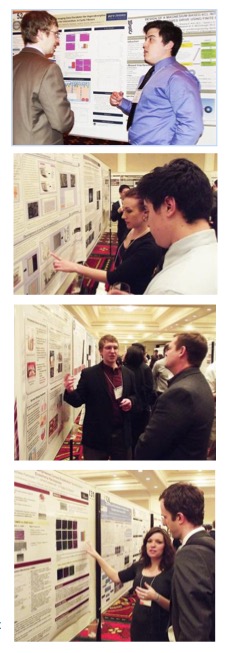 The McGowan Institute for Regenerative Medicine held its 2014 Scientific Retreat March 9-11, 2014. The focus was on peer-to-peer networking, and the retreat provided many opportunities to explore collaborative endeavors with other researchers, participating guests, and external partners who are working to bring regenerative medicine technologies to clinical use.
The McGowan Institute for Regenerative Medicine held its 2014 Scientific Retreat March 9-11, 2014. The focus was on peer-to-peer networking, and the retreat provided many opportunities to explore collaborative endeavors with other researchers, participating guests, and external partners who are working to bring regenerative medicine technologies to clinical use.
The participation and contributions of the guests and external collaborators – along with McGowan Institute for Regenerative Medicine affiliated faculty and trainees – provided for insightful discussions and identification of opportunities for partnership. This year’s program was chaired by Kacey Marra, PhD, Associate Professor in the Departments of Plastic Surgery (primary) and Bioengineering (secondary), as well as Co-Director of the Adipose Stem Cell Center at the University of Pittsburgh.
Program Highlights:
The retreat progra m included special presentations by the following guests:
- Arthur S. Levine, MD, Senior Vice Chancellor and Dean-School of Medicine, University of Pittsburgh: “Welcome to the MIRM Annual Retreat and to the University of Pittsburgh”
- McGowan Institute Distinguished Lecture “The Critical Role of Extracellular Matrix and Microenvironment in Metastasis and Dormancy” by Mina Bissell, PhD, Distinguished Scientist, Life Sciences Division, Lawrence Berkeley National Laboratory
- Highlights of emerging clinical therapies introduced by J. Peter Rubin, MD and Peter Wearden, MD, PhD.
The Retreat program also included a great cross-section of scientific presentations given by invited researchers from other departments, institutions and agencies who are not formally affiliated with the Institute.
A special session addressing career tracks as shared by recent graduates included presentations by:
- Priya Baraniak, PhD, Director of Business Development, RoosterBio: ”From Graduate Training to Postdoc in Academia and Then Industry”
- Matthew Fisher, PhD, Assistant Professor-Joint Department of Biomedical Engineering, North Carolina State University and the University of North Carolina-Chapel Hill: “Staying in Academia”
- Zahida Khan, MD, PhD, Pediatric Gastroenterology Fellow, Children’s Hospital of Pittsburgh: “MD/PhD Track”
- Tim Maul, PhD, ECMO Coordinator, Children’s Hospital of Pittsburgh, and Research Assistant Professor, University of Pittsburgh: “Staying in Academia”
The Retreat saw increased participation by representatives from industry; industry representatives included:
 ACell, Inc.
ACell, Inc.- ALung Technologies, Inc.
- BioSphenix, Ltd
- Dow Corning Corp.
- Instron, Inc.
- MPI Research
- Omnyx, LLC
- RoosterBio
- Vertex, Inc.
Elevator Pitch Competition
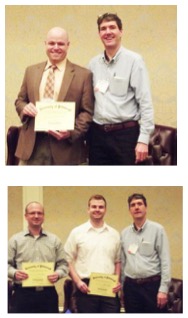 Under the leadership of Paul J. Petrovich, CPA, the University of Pittsburgh, Office of Enterprise Development (OED), hosted the “Innovator Elevator Pitch Contest.” This event consisted of a series of scheduled brief presentations from on the value of their technology to an audience which included industry participants, faculty and trainees.
Under the leadership of Paul J. Petrovich, CPA, the University of Pittsburgh, Office of Enterprise Development (OED), hosted the “Innovator Elevator Pitch Contest.” This event consisted of a series of scheduled brief presentations from on the value of their technology to an audience which included industry participants, faculty and trainees.
This year, there were two prizes-one winner was determined by the audience and one by the expert commentators/judges. The winners were:
By the judges:
Rapid Preservation Catheter for Transplant Organ Recovery
By Bryan Tillman, MD, PhD
By the audience:
CuroStem ™: Cellular Band age
By: Don Taylor, PhD and Austin Nuschke
The two winning “pitches” received guaranteed acceptance into the Innovation Institute’s Pitt Venture 1st Gear Enterprise Creation Team (EC Team) Development Program. This program provides a $6,000 award to establish and train EC Teams to “Articulate the Opportunity for the Technology.” The award will fund the student’s participation in 1st Gear and can also be used to further the technology development and commercial understanding, including travel to interview prospective customer segments.
Poster Session
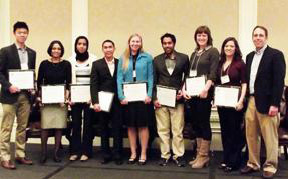 The poster session, which had more entries than any other Retreat, was effective in introducing the focus of the Retreat and interests of the faculty and the guests. Andrew Duncan, PhD, Assistant Professor in the Department of Pathology, Division of Experimental Pathology, University of Pittsburgh, and his committee organized the session and judged the posters. The winners of the poster session were:
The poster session, which had more entries than any other Retreat, was effective in introducing the focus of the Retreat and interests of the faculty and the guests. Andrew Duncan, PhD, Assistant Professor in the Department of Pathology, Division of Experimental Pathology, University of Pittsburgh, and his committee organized the session and judged the posters. The winners of the poster session were:
Category: Cellular Therapy
- First place: Aparna Rao
- Mentor: Eric Lagasse, PharmD, PhD
- Department Pathology; University of Pittsburgh
- “Engineering an ectopic thymus in the lymph node to induce central tolernce and long-term allograft acceptance”
- Runner-up: Mehwish Khaliq
- Mentor: Donghun Shin, PhD
- Department of Developmental Biology; University of Pittsburgh
- “Characterization and role of id2a in zebrafish liver development and regeneration”
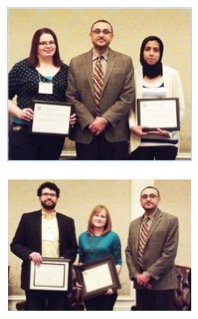 Category: Medical Devices
Category: Medical Devices
- First place: Molly Blank
- Mentor: James Antaki, PhD
- Department of Biomedical Engineering; Carnegie Mellon University
- “Design and assessment of a breast palpation device alpha-prototype for the quantification of breast lesions”
- Runner-up: Salim Olia
- Mentor: Marina Kameneva, PhD
- Department of Bioengineering; University of Pittsburgh
- “A Novel Left Ventricle Inflow Cannula for the PediaFlow® Pediatric Ventricular Assist Device”
Category: Computation and Modeling
- First place: Callie Miller
- Mentor: Lance Davidson, PhD
- Department of Bioengineering; University of Pittsburgh
- “Mechanics of actomyosin linear morphologies”
- Runner-up: Thang Ho
- Mentor: Robert Parker, PhD
- Department of Chemical and Petroleum Engineering; University of Pittsburgh
- “An Algorithm for Patient-Specific Cancer Chemotherapy Scheduling”
Category: Tissue Engineering
- First place: Saik-Kia Goh
- Mentor: Ipsita Banerjee, PhD
- Department of Bioengineering; University of Pittsburgh
- “In-vivo Maturation of Endocrine Pancreas based on Perfusion-Decellularized Pancreatic Matrix and Human Embryonic Stem Cells”
- Runner-up: Rachelle Palchesko, PhD
- Mentor: Adam Feinberg, PhD
- Department of Biomedical Engineering; Carnegie Mellon University
- Department of Ophthalmology; University of Pittsburgh
- “Development of a Human Bioengineered Corneal Endothelium Towards Use in Endothelial Keratoplasty”
CATER Poster Session Winners:
- First place: Megan A. Jamiolkowski
- Mentor: William R. Wagner, PhD
- Department of Bioengineering; University of Pittsburgh
- “Real Time Visualization and Characterization of Platelet Deposition under Flow onto Clinically-Relevant Opaque Surfaces”
- Runner-up: Mehwish Khaliq
- Mentor: Donghun Shin, PhD
- Department of Developmental Biology; University of Pittsburgh
- “Characterization and role of id2a in zebrafish liver development and regeneration”
Recognition of Recent CATER Graduates:
Julie Cramer, PhD and Christopher Medberry, PhD
Door Prizes:
Winners of the door prizes were Xinzhu Gu, Alan Wells, PhD, and Brian Sicari, PhD. Prizes were courtesy of Nemacolin Woodlands.
A special thank you is extended to all who made this year’s Retreat a success!
See the full Retreat Program here.
RESOURCES AT THE MCGOWAN INSTITUTE
Where to Go For Help When Your Innovation Might Have Commercial Potential
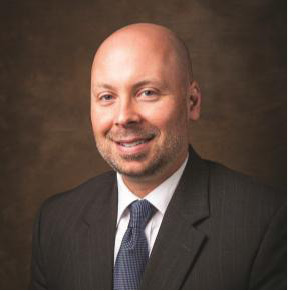 When it comes to innovation, McGowan Institute faculty and their research teams continue to develop plenty of interest and ideas from their research, but what to do with it always remains a key question at Pitt.
When it comes to innovation, McGowan Institute faculty and their research teams continue to develop plenty of interest and ideas from their research, but what to do with it always remains a key question at Pitt.
That’s why innovation commercialization expert Alex Ducruet has continued to station himself prominently at the Institute every Monday for the past several years. And he’s there to answer that question.
Ducruet is Assistant Director for Licensing at the University’s Office of Technology Management (OTM), and for the past several years, he has served as a key link between McGowan faculty and the University’s efforts to commercialize innovations that emerge from Pitt research. Every week, Ducruet brings with him both the authority and creative expertise of Pitt’s technology transfer office as he walks the halls of the Institute and offers to provide the many services available through the OTM to help Pitt Innovators move their ideas into the commercial marketplace.
In effect, Ducruet represents the OTM as a portal through which McGowan faculty can access the following: potential intellectual property protection; entrepreneurial educational opportunities; assistance with value proposition and business opportunity development; help with starting new companies around an innovation; and connections to potential commercial partners. Ducruet is part of a team of commercialization experts at the OTM that provides such hands-on support.
This partnership with the OTM, which now is part of the University’s new Innovation Institute, was established when Marc Malandro, Associate Vice Chancellor for Technology Management and Commercialization and Director of the OTM, saw a need for a closer and more proactive OTM presence in the innovation-rich McGowan Institute. The partnering effort has been going h3 since then.
Already, this partnering effort has led to many growing commercialization-based relationships between Ducruet and McGowan researchers, as well as significant progress in moving McGowan-originated innovations toward the marketplace. Among the more active participants in this partnership is Dr. Stephen Badylak, whose work in extracellular matrix research has led to numerous new innovations that have been submitted to the OTM for commercial consideration (see the OTM 2013 Annual Report at www.innovation.pitt.edu for more information about Dr. Badylak’s collaborations with the OTM).
Says Dr. Badylak of his working relationship with Ducruet: “The frequent interactions with Alex Ducruet have been an asset to my work, both by Alex’s personal contributions and through the other resources that Alex has introduced me to.”
Other partnership outcomes so far have included the following:
- Experience has shown that informal dialogue among faculty, their research teams, and OTM in assessing the viability of an innovation for potential commercialization proves helpful in the early stages, particularly when considering when or if they should submit an invention disclosure.
- Follow-on support through the preparation of an invention disclosure with expert technical and administrative support – by someone who has been engaged in the formative stages of an IP filing — has proven to be invaluable.
- Experience has shown that, when an OTM representative has in-depth knowledge of the technology, that the discussions with prospective licensees are more effective and more frequently successful.
“OTM is committed to fostering a culture of innovation commercialization and entrepreneurship among Pitt’s faculty, staff, and student researchers, as well as building h3 industry partnerships and contributing proactively to regional economic development as part of the University’s educational mission,” says Malandro, who also is the Interim Director of the new Innovation Institute. “The regular interactions with McGowan faculty have demonstrated the positive value of partnerships such as the OTM/McGowan relationship.”
As such, you still can find Alex Ducruet in the McGowan Institute offices every Monday, looking to develop new and h3er relationships with researchers whose innovations might have commercial potential. Otherwise, you can contact him at aducruet@innovation.pitt.edu or call him at 412-648-2219.
April Special at the Histology Lab

Old Man Winter has packed his bags and headed North for a well-deserved vacation! Before we say goodbye to the chilly thrills of winter, let’s have one more month of frozen fun! Bring your frozen tissue to the McGowan Lab for 30% off frozen tissue sectioning and 30% off our Beautiful Oil Red O Staining!
Oil Red O (Lipid Stain) is intended for use in the histological visualization of fat cells and neutral fat. The staining has to be performed on fresh samples, as alcohol fixation removes most lipids.
The McGowan Histology Lab is equipped with state of the art Processing, Embedding, and Staining Automation, including Instruments for paraffin and frozen sections alike.
Contact Lori at the McGowan Core Histology Lab about the Frozen Specials of April. She will be happy to offer you a 30% discount on these chilly techniques.
As always, you will receive the highest quality histology in the lowest amount of time.
Did you know the more samples you submit to the histology lab the less you pay per sample? Contact Lori to find out how!
Email perezl@upmc.edu or call 412-624-5265
Flow Cytometry at the McGowan Institute
Would you like to know more about Flow Cytometry? Would you like to find a way to expand your current flow experiments beyond 2, 3, or 4 colors? Ever wonder how you can utilize cell sorting in your experiments? Flow Cytometry at the McGowan Institute is sponsoring a seminar by BD Technical Applications Specialist Andrew Bantly on May 1, 2014 at 10am in room 503 Bridgeside Point II. Your questions have been heard and understood. This is your chance to hear the answers! Discussion topics will include: ‘growing’ an existing experiment to provide additional data, the bright new BrilliantViolet and BrilliantUV fluorescent dyes, and Index Sorting. Feel free to bring your experimental data, questions and concerns. Andrew and Tim Stewart will happily discuss questions specific to each of your projects during and after the seminar.
In conjunction with this seminar, the Flow Cytometry Facility is holding two contests! It’s easy to enter. First – attend the BD seminar on May 1st. Then – for the first contest – just design and run a flow experiment utilizing 9 or more colors, including at least 2 BV or BUV colors, by June 15, 2014. The group successfully utilizing the most colors will win 2 free hours of time on the FACSAria. In the event of a tie, a drawing will be held to determine the winner. For the second contest – any lab running a flow experiment with less than 9 colors between May 2nd and June 15th will be entered in a drawing for 1 free hour of time on the FACSAria. The winning labs must use their prize by July 30, 2014.
Please RSVP to Lynda Guzik by end of day Friday, April 25th to provide an approximate attendance count. Light refreshments will be provided.
UPCOMING EVENTS
Biologic Scaffolds for Regenerative Medicine 8th Symposium
 The 8th annual Biologic Scaffolds for Regenerative Medicine will be held at the Silverado Resort – Napa Valley, California on April 24 – 26, 2014. Chaired by Stephen F. Badylak, DVM, PhD, MD, morning and afternoon panel discussions will follow the eight sessions including: Whole Organ Engineering with Biologic Scaffold Materials, Bone, Blood Vessels, and Cardiac Reconstruction, Variables that Affect Clinical Performance of Biologic Scaffold Materials, General Surgery Applications, Role of the Innate Immune Response in Constructive Remodeling and Regeneration, Cell-Matrix Interaction and Clinical Applications, Clinical Applications of Biologic Scaffolds, and Cardiovascular Applications of Biologic Scaffold Materials.
The 8th annual Biologic Scaffolds for Regenerative Medicine will be held at the Silverado Resort – Napa Valley, California on April 24 – 26, 2014. Chaired by Stephen F. Badylak, DVM, PhD, MD, morning and afternoon panel discussions will follow the eight sessions including: Whole Organ Engineering with Biologic Scaffold Materials, Bone, Blood Vessels, and Cardiac Reconstruction, Variables that Affect Clinical Performance of Biologic Scaffold Materials, General Surgery Applications, Role of the Innate Immune Response in Constructive Remodeling and Regeneration, Cell-Matrix Interaction and Clinical Applications, Clinical Applications of Biologic Scaffolds, and Cardiovascular Applications of Biologic Scaffold Materials.
The keynote speakers are Joseph P. Vacanti, MD of Massachusetts General Hospital (“Tissue Engineered Organs: More than One Way to the End Zone”) and Alberto Mantovani, MD of the University of Milan (“Macrophage Polarization in Tissue Remodeling and Repair”).
Third Annual Regenerative Rehabilitation Symposium
The annual Regenerative Rehabilitation Symposia series is a unique opportunity for students, researchers, and clinicians working in the interrelated fields of regenerative medicine and rehabilitation to meet, exchange ideas, and generate new collaborations and clinical research questions. Jointly organized by the University of Pittsburgh Rehabilitation Institute, the School of Health and Rehabilitation Sciences at the University of Pittsburgh, the McGowan Institute for Regenerative Medicine and the Rehabilitation Research and Development Center of Excellence at the Veterans Affairs Palo Alto Health Care System, the Third Annual Symposium on Regenerative Rehabilitation will be held on April 10-11, 2014 in San Francisco, CA at the Mission Bay Conference Bay at the University of California, San Francisco (UCSF).
The objectives of this event are:
- To promote the clinical translation of regenerative medicine scientific discoveries by communicating and disseminating research findings that demonstrate the synergistic relationship between regenerative medicine and rehabilitation;
- To provide a forum by which scientists and rehabilitation clinicians may interact, exchange ideas, and identify novel research directions relating to the field of regenerative rehabilitation; and
- To introduce the concept of regenerative rehabilitation to graduate students, medical students and medical residents in the rehabilitation field.
For more information on this event, please contact Katy Wharton at: rehabmtg@pitt.edu or whartonkm@upmc.edu or 412-624-5293.
Regenerative Medicine Summer School
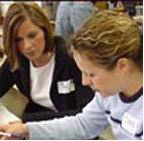 Under the leadership of Bryan Brown, PhD, the McGowan Institute is organizing the first annual Regenerative Medicine Summer School which will be held July 14-18, 2014. The program is designed to provide national and regional students with a week-long didactic and experiential learning experience addressing the science and engineering related to the multidisciplinary field of regenerative medicine.
Under the leadership of Bryan Brown, PhD, the McGowan Institute is organizing the first annual Regenerative Medicine Summer School which will be held July 14-18, 2014. The program is designed to provide national and regional students with a week-long didactic and experiential learning experience addressing the science and engineering related to the multidisciplinary field of regenerative medicine.
The target audience is undergraduates, enrolled in a science or engineering program that will have completed their 3rd year of study; exceptional candidates who will have completed their 1st or 2nd year of undergraduate study will be considered.
SCIENTIFIC ADVANCES
Pitt Study Finds Mechanism for Increased Activity of Oncogene in Head and Neck Cancers
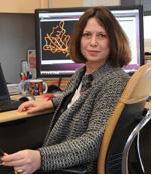 In a recent study led by researchers at the University of Pittsburgh School of Medicine, McGowan Institute for Regenerative Medicine affiliated faculty member Ivet Bahar, PhD, the John K. Vries chair and professor in the Department of Computational & Systems Biology at the University of Pittsburgh and the associate director of the University of Pittsburgh Drug Discovery Institute, and colleagues report the increased activation of a key oncogene in head and neck cancers could be the result of mutation and dysfunction of regulatory proteins that are supposed to keep the gene, which has the potential to cause cancer, in check. The findings, published in The Proceedings of the National Academy of Sciences, suggest a new target for drugs to treat head and neck tumors, as well as other cancers.
In a recent study led by researchers at the University of Pittsburgh School of Medicine, McGowan Institute for Regenerative Medicine affiliated faculty member Ivet Bahar, PhD, the John K. Vries chair and professor in the Department of Computational & Systems Biology at the University of Pittsburgh and the associate director of the University of Pittsburgh Drug Discovery Institute, and colleagues report the increased activation of a key oncogene in head and neck cancers could be the result of mutation and dysfunction of regulatory proteins that are supposed to keep the gene, which has the potential to cause cancer, in check. The findings, published in The Proceedings of the National Academy of Sciences, suggest a new target for drugs to treat head and neck tumors, as well as other cancers.
Many research teams have found activation and increased signaling of a protein known as Signal Transducer and Activator of Transcription 3 (STAT3) in different kinds of cancers, and it is associated with poor prognosis, said senior author Jennifer Grandis, MD, Distinguished Professor of Otolaryngology, Pitt School of Medicine, and director of the Head and Neck Program at the University of Pittsburgh Cancer Institute (UPCI), partner with UPMC Cancer Center. In adult tissues, STAT3 triggers the production of other proteins that promote the growth and survival of cancer cells.
“Until now, the question of why STAT3 could be hyperactivated has gone unanswered,” Dr. Grandis said. “Our findings reveal a possible mechanism for this abnormal activity, which could help us develop new cancer drugs.”
Noting that gene aberrations in STAT3 itself rarely occurred in head and neck cancers, she and her colleagues looked for mutations in other proteins associated with increased activity of STAT3. To be activated, STAT3 must be phosphorylated, meaning a phosphate group is added to it. Many cancer drugs work by inhibiting enzymes called kinases that encourage this process. The team focused instead on the other side of the biochemical seesaw in which enzymes called phosphatases deactivate proteins by removing phosphates.
To their surprise, they found head and neck tumors with elevated STAT3 were associated with mutations in the PTPR family of phosphatases. When they reproduced the mutations in computational and lab models, they saw that they led to dysfunction of the enzymes.
“Because the phosphatases don’t work properly, phosphate groups don’t get removed from STAT3 appropriately, and it stays activated,” Dr. Grandis explained. “These mutations essentially get rid of the brakes that might otherwise slow or even stop cancer development.”
It might be possible one day to screen tumors for mutations in the PTPR group and then treat them with drugs that inhibit STAT3’s activity, she added.
Lizards May Answer Cartilage Regeneration Mystery
 Research from the lab of McGowan Institute for Regenerative Medicine Associate Director Rocky Tuan, PhD, was recently presented by postdoctoral fellow Thomas Lozito, PhD, at the Orthopaedic Research Society’s (ORS) 2014 Annual Meeting in New Orleans. Dr. Lozito shared with the audience the results of their study on lizard cartilage.
Research from the lab of McGowan Institute for Regenerative Medicine Associate Director Rocky Tuan, PhD, was recently presented by postdoctoral fellow Thomas Lozito, PhD, at the Orthopaedic Research Society’s (ORS) 2014 Annual Meeting in New Orleans. Dr. Lozito shared with the audience the results of their study on lizard cartilage.
Cartilage is the connective tissue found throughout the body. As a result of injury or disease, cartilage can become damaged or even wear away causing pain and discomfort. Unlike muscle, human cartilage does not have the ability to heal itself. As a result, millions of people suffer from pain and stiffness caused by damaged cartilage.
While the inability of cartilage to heal itself is the unfortunate reality for most higher vertebrates, there is one notable exception: the lizard. Lizards possess the unique ability to regrow their tail. However, the newly grown tail has no bones. Instead, the “skeleton” consists of cartilage hearty enough to support the new tail.
The fascinating and unique ability to regrow cartilage has made Dr. Lozito and Dr. Tuan, Director of the Center for Cellular and Molecular Engineering, Department of Orthopaedic Surgery, University of Pittsburgh School of Medicine, take a closer look at these reptiles.
“We study lizard cartilage,” Dr. Lozito explained, “to understand how it is able to be maintained in such a robust state. We have identified several key molecules known to play roles in normal skeletal development that are turned on in unusual and interesting patterns during lizard tail cartilage growth. These molecules are responsible for the unique tissue properties of regenerated lizard cartilage.”
The lizard’s ability to regenerate cartilage is of particular interest to researchers since scientists have been unable to successfully replicate this ability in humans.
“So far, our best attempts to engineer cartilage tissue in the lab often results in cartilage that eventually calcifies and is replaced by bone,” Dr. Lozito said. This does little to help those who suffer from injury or degenerative joint diseases, such as osteoarthritis.
What’s next for the team of researchers? For starters, the team plans to study what properties of the regenerated lizard tail make it conducive for cartilage growth.
“We have evidence that lizard cells themselves are particularly primed for differentiating into cartilage,” Dr. Lozito said, “and that lizard cartilage itself contains a population of stem cells that readily forms new cartilage in response to trauma. This is practically the opposite of what occurs following damage to human cartilage.”
Down the road, the team hopes that what they learn from our reptile friends will help the human population. “We believe identifying the signals and cellular properties underlying the regenerative power of lizard tail cartilage will afford new insights into actual cartilage regeneration and potentially yield lizard-inspired therapeutics and treatments for human cartilage diseases.”
Illustration: Wikipedia.
Biomarkers That Can Provide Advance Warning of Deadly Kidney Condition in Critically Ill Patients Identified
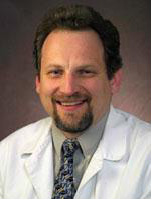 A national, multi-center study led by McGowan Institute for Regenerative Medicine affiliated faculty member and senior investigator John Kellum, MD, a Critical Care Physician at UPMC and Director of the Pitt Center for Critical Care Nephrology, found biomarkers that can tell a physician if a patient is at risk for acute kidney injury (AKI), a condition that often affects those in intensive care and can occur hours to days after serious infections, surgery, or taking certain medications.
A national, multi-center study led by McGowan Institute for Regenerative Medicine affiliated faculty member and senior investigator John Kellum, MD, a Critical Care Physician at UPMC and Director of the Pitt Center for Critical Care Nephrology, found biomarkers that can tell a physician if a patient is at risk for acute kidney injury (AKI), a condition that often affects those in intensive care and can occur hours to days after serious infections, surgery, or taking certain medications.
The results, now available in the American Journal of Respiratory and Critical Care Medicine, validates previous research from this group identifying the biomarkers, known as tissue inhibitor of metalloproteinase 2 (TIMP-2) and insulin-like growth factor binding protein 7 (IGFBP-7) in urine, that signal the kidneys are stressed and at risk for failing. The biomarkers are indicators of cell damage, a key component in the onset of AKI.
“AKI remains one of the most common complications among critically ill patients, affecting up to 7 percent of all hospitalized patients, yet we lack a precise and reliable method of discerning risk,” said Dr. Kellum. “By providing actionable information, this study advances the translation of biomarker technology into routine practice.”
Investigators enrolled 420 critically ill patients. The primary analysis assessed the ability of the biomarkers to predict moderate to severe AKI within 12 hours of test measurement. To confirm the findings, a committee of three independent expert nephrologists who were blinded to the results of the test reviewed the cases to diagnose AKI.
AKI is asymptomatic, lacking warning signs such as pain, shortness of breath, or other clinical symptoms, particularly in the early stages when intervention is most beneficial. The incidence of AKI is high among critically ill patients, with up to 50 percent developing some degree of AKI during their illness, increasing the risk of death due to kidney failure.
“This new study confirms these findings using an expert panel to adjudicate AKI—the first ever to do so for this disease,” said Dr. Kellum.
Pitt Researchers to Study New Treatments for Pancreatic Cancer Patients
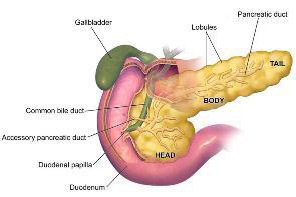 McGowan Institute for Regenerative Medicine affiliated faculty member Michael Lotze, MD, professor of surgery, immunology, and bioengineering, and assistant vice chancellor, University of Pittsburgh Schools of the Health Sciences, is the co-principal investigator on a National Institutes of Health (NIH) 5-year grant of more than $1.5 million to study a novel treatment for pancreatic ductal adenocarcinoma (PDA), the most common form of pancreatic cancer. Herbert J. Zeh III, MD, associate professor of surgery and chief of the Division of Gastrointestinal Surgical Oncology at University of Pittsburgh Cancer Institute and UPMC CancerCenter, is also a co-principal investigator on the award.
McGowan Institute for Regenerative Medicine affiliated faculty member Michael Lotze, MD, professor of surgery, immunology, and bioengineering, and assistant vice chancellor, University of Pittsburgh Schools of the Health Sciences, is the co-principal investigator on a National Institutes of Health (NIH) 5-year grant of more than $1.5 million to study a novel treatment for pancreatic ductal adenocarcinoma (PDA), the most common form of pancreatic cancer. Herbert J. Zeh III, MD, associate professor of surgery and chief of the Division of Gastrointestinal Surgical Oncology at University of Pittsburgh Cancer Institute and UPMC CancerCenter, is also a co-principal investigator on the award.
PDA is the fourth-leading cause of cancer deaths in the United States. The 5-year survival of patients suffering from PDA is less than 5 percent.
The pair hypothesize that the cancer progresses and is difficult to treat because of a biological pathway called autophagy, a form of programmed cell survival that tumor cells use to avoid apoptosis, or cell death.
“It is our hope that blocking autophagy, a new approach to treating cancer, will improve the efficacy of chemotherapy for pancreatic cancer patients,” said Dr. Lotze.
“Our goal with this award is to improve the quality of life for patients with pancreatic cancer,” said Dr. Zeh.
Illustration: The pancreas. –Wikipedia.
Innovative Brain Imaging Technology Receives DSF Charitable Foundation Funding
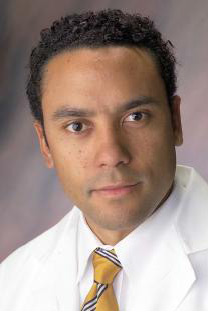 The DSF Charitable Foundation (the charitable-giving organization of the David Scaife family) is providing $1.8 million over 3 years to support the study of an innovative brain imaging technology called high-definition fiber tracking (HDFT) for veterans of the U.S. military who have s ustained traumatic brain injuries (TBI).
The DSF Charitable Foundation (the charitable-giving organization of the David Scaife family) is providing $1.8 million over 3 years to support the study of an innovative brain imaging technology called high-definition fiber tracking (HDFT) for veterans of the U.S. military who have s ustained traumatic brain injuries (TBI).
The HDFT project, led by McGowan Institute for Regenerative Medicine affiliated faculty member David Okonkwo, MD, PhD (pictured), Associate Professor of Neurological Surgery and Director of the Brain Trauma Program, and Walter Schneider, PhD, Professor of Psychology, Neurological Surgery and Radiology, and a Senior Scientist at Pitt’s Learning Research and Development Center, aims to reveal damage to the fiber tracts, or cables, of the brain just as X-rays indicate broken bones.
“Conventional imaging techniques are not able to show these injuries, so it’s harder to diagnose, treat, or monitor them,” Dr. Okonkwo said. “HDFT has the potential to identify TBI quickly and accurately, which could in turn influence therapy and recovery.”
In addition to HDFT scans, participants in the research project will receive a toolkit that includes material to carry out targeted therapies, mobile technology to support ongoing monitoring, and other treatment aids.
Pitt Establishes Brain Institute to Unlock Mysteries of the Brain, Discover Novel Therapies
 The University of Pittsburgh is creating a new Institute that aims to unlock the mysteries of normal and abnormal brain function, and then use this new information to develop novel treatments and cures for brain disorders. The new Institute will function like a Bell Labs for brain research and provide a special environment to promote innovation and discovery. The goal is to enable investigators to perform high-risk, high-impact neuroscience that will transform lives.
The University of Pittsburgh is creating a new Institute that aims to unlock the mysteries of normal and abnormal brain function, and then use this new information to develop novel treatments and cures for brain disorders. The new Institute will function like a Bell Labs for brain research and provide a special environment to promote innovation and discovery. The goal is to enable investigators to perform high-risk, high-impact neuroscience that will transform lives.
“Pittsburgh has earned well-deserved respect as one of the world’s leading centers for groundbreaking research in neuroscience,” said University of Pittsburgh Chancellor Mark A. Nordenberg. “We have the intellectual firepower to take a lead role in the nationwide effort to revolutionize the understanding of the brain. The creation of our Brain Institute reflects the high priority that we have assigned to this important work and will position Pitt for even higher levels of impact and achievement in the years ahead. It also will strengthen our ongoing local, national and international research efforts, such as the Center for the Neural Basis of Cognition, which is a joint program with Carnegie Mellon University.”
The Brain Institute’s founding scientific director is Peter Strick, PhD, Distinguished Professor and chair, Department of Neurobiology. He is a leading expert on the neural basis of movement and cognition and a McGowan Institute for Regenerative Medicine affiliated faculty member. Dr. Strick pioneered the use of viruses to reveal circuits of interconnected neurons. This technique is widely seen as one of the most powerful approaches yet developed to “map the brain.” His studies provide insights into what goes wrong in a wide range of brain disorders such as Parkinson’s disease, dystonia, autism, depression, and schizophrenia. Most recently, he has begun to explore the brain connections that form the basis for the mind-body connection. Dr. Strick was recently elected to membership in the National Academy of Sciences. He holds the Endowed Chair in Systems Neuroscience, is co-director of the Center for the Neural Basis of Cognition and the Center for Neuroscience at the University of Pittsburgh, and is a Senior Research Career Scientist at the VA Pittsburgh Healthcare System.
“The critical task of discovering how the brain develops, how it functions normally, and how to alleviate and cure abnormal function requires a broad, multi-level and multi-disciplinary approach,” Dr. Strick said. “In other words, it ‘takes a University.’ I am enormously proud that the University of Pittsburgh has taken on this challenge.”
Initially, five centers will be established at the Brain Institute. They are:
NeuroTech Center to restore movement to the paralyzed and vision to the blind, and to develop new technology-based treatment approaches for motor and cognitive disorders. To do so, the Center will create new tools for long-term recording from and stimulation of populations of neurons in the human brain.
- A NeuroGenetics Center to develop non-human primate models of neurodevelopmental, neuropsychiatric, and neurodegenerative disorders to accelerate the development of new cures and treatments for neural disorders.
- A NeuroMapping Center to unravel the complex circuitry and patterns of activity that are the neural bases of movement, cognition, emotion, learning, language, and creativity — in other words, all that makes us human. This Center will be deeply involved in exploring the mind-body connection that is the basis of the emerging field of Health Neuroscience.
- A NeuroLearning Center to study the biological bases of learning and memory, including the brain changes that accompany learning in educational domains, in human development, and in overcoming cognitive impairment.
- A NeuroDiscovery Center, the equivalent of a Bell Labs for neuroscience, to support particularly innovative, multidisciplinary, and high-risk/high-reward neuroscience research.
Currently, there are few effective treatments for most brain disorders, and cures are far from imminent for many chronic and debilitating neurodegenerative and psychiatric diseases. “As the Baby Boomer population ages, we are facing a health crisis caused by the growing burden of neurologic and neuropsychiatric disease,” Dr. Strick said. “The basic science and the translational research fostered by the Brain Institute are the critical first steps that must be taken to meet this challenge.”
Illustration: Microsoft clipart.
AWARDS AND RECOGNITION
Dr. Krzysztof Matyjaszewski Named National Academy of Inventors Fellow
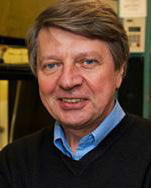 McGowan Institute for Regenerative Medicine affiliated faculty member Krzysztof Matyjaszewski, PhD, the J.C. Warner University Professor of Natural Sciences and professor of chemistry in the Mellon College of Science, Carnegie Mellon University (CMU), has been elected a Fellow of the National Academy of Inventors (NAI).
McGowan Institute for Regenerative Medicine affiliated faculty member Krzysztof Matyjaszewski, PhD, the J.C. Warner University Professor of Natural Sciences and professor of chemistry in the Mellon College of Science, Carnegie Mellon University (CMU), has been elected a Fellow of the National Academy of Inventors (NAI).
NAI Fellows are recognized for their “prolific spirit of innovation in creating or facilitating outstanding inventions and innovations that have made a tangible impact on quality of life, economic development, and the welfare of society.”
Dr. Matyjaszewski is best known for the discovery of atom transfer radical polymerization (ATRP), a novel method of polymer synthesis that has revolutionized the way macromolecules are made. Dr. Matyjaszewski has used ATRP to make a wide range of “smart” materials that respond to environmental changes including polymers that can be useful in the aviation and automotive industry, nanogel capsules that can be used for targeted drug delivery, and sealants that are used in the manufacturing of self-cleaning glass.
Dr. Matyjaszewski is a co-inventor on 132 international and 46 U.S. patented technologies, and has 26 U.S. patent applications pending approval. ATRP technology developed by Dr. Matyjaszewski has been licensed to 16 companies across the world, and the CMU spinoff company, ATRP Solutions, aids companies as they develop next generation materials.
 Regenerative Medicine Podcast Update
Regenerative Medicine Podcast Update
The Regenerative Medicine Podcasts remain a popular web destination. Informative and entertaining, these are the most recent interviews:
#133 – Dr. David Allenson Borton is an Assistant Professor of Neuroengineering at Brown University, and the Marie Curie Fellow at the Swiss Federal Institute of Technology. Dr. Borton discusses his research on brain and spinal cord reorganization with neuromotor disease.
Visit www.regenerativemedicinetoday.com to keep abreast of the new interviews.
PICTURE OF THE MONTH
CD146+ Perivascular stem cells (PVSC, red) and CD31+ endothelial cells (green) present within a remodeling extracellular matrix (ECM) bioscaffold surgically placed to treat volumetric skeletal muscle loss. Myogenic PVSCs were found in their normal anatomic niche encircling microcapillaries, as well as outside their niche, suggesting that they participate in the constructive remodeling of the ECM bioscaffold.
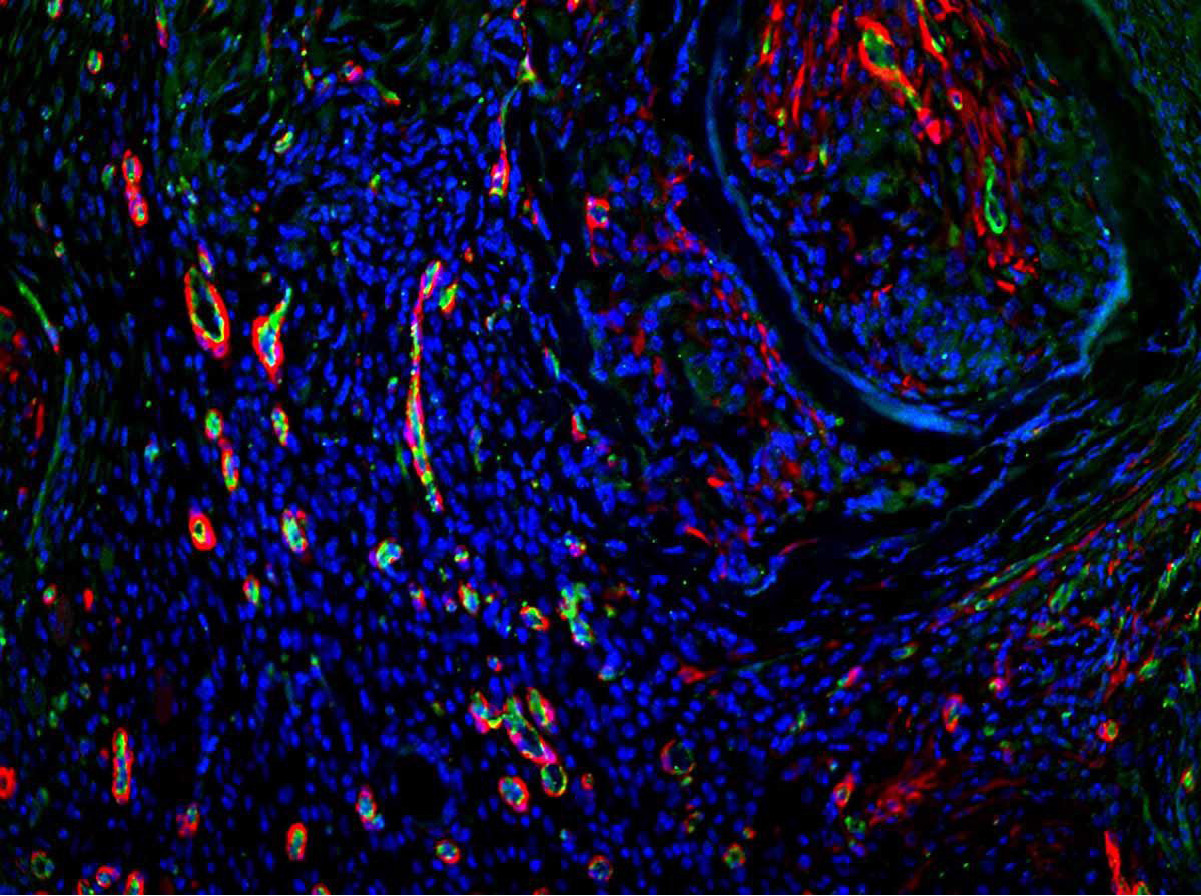
Photo credit: Jenna Dziki, Brian Sicari (recent graduate of the Cellular and Molecular Pathology graduate program), Stephen Badylak
We welcome submissions from others for future Pictures of the Month.
